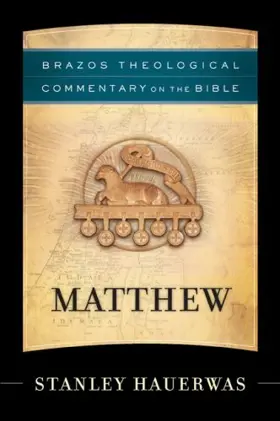

Matthew
in Brazos Theological Commentary on the Bible
Pages
272
Publisher
Brazos Press
Published
12/1/2006
ISBN-13
978-1-58743-095-4
Reviews
Really fresh, radical reading of Matthew's gospel.
There are times here where one wonders if we are listening to Matthew or to Hauerwas. But Hauerwas is always worth reading.
Stanley Hauerwas' theological commentary on Matthew approaches this Gospel from a thematic standpoint, largely centered on the implications of following Christ. It also addresses relevant topics such as abortion, homosexuality and marriage in a timely, penetrating way. Throughout this volume, Hauerwas interacts with the writings of theologians such as Dietrich Bonhoeffer, Karl Barth and John Howard Yoder. As expected, Christian ethics and pacifism are well explicated at key points throughout this book. He gently challenges the Reformational understanding that views the Sermon on the Mount as Law rather than Gospel, and argues that it reflects the obligations now placed upon all who call themselves Christians. His explanation of the relationship between Israel and the Church is seemingly vague, which undoubtedly will frustrate both Dispensationalists and Covenantalists alike. At one point, he seems to question the eternal nature of the human soul by implication without explicitly denying it. Interestingly, he interprets Jesus' reference in Matthew 24:15 to 'the abomination that causes desolation' from Daniel 9:27 as a prediction of Christ's own crucifixion, which brought about the subsequent end of the Jewish Temple system. The section on Matthew 24 and 25 contains a healthy discussion about the nature of apocalyptic literature and its relationship to our anticipation of the Second Coming. It is a welcome corrective to the paranoia peddled by the authors of the Left Behind series. Hauerwas' interpretative decisions clearly demonstrate his familiarity with current Matthean scholarship. My only minor quibble is that he doesn't articulate why he chose one particular interpretation over another. This is especially important when dealing with passages like Matthew 24:15. I recommend that those planning to preach or teach through Matthew supplement Hauerwas' volume, which only offers broad commentary on each chapter and subsequently doesn't address the entire text of Matthew in a verse-by-verse manner, with R.T. France's The Gospel of Matthew in the NICNT series, which is the most thorough commentary on this Gospel currently available.
Christians need to see why some interpretations are more viable than others. This is one of the primary reasons why people consult commentaries in the first place. While it's true that more linguistically-oriented exegetical commentaries already do this, it would be refreshing for the Brazos Theological Commentary to explain why certain interpretations are THEOLOGICALLY correct while others are erroneous. Hopefully, subsequent volumes will contain such helpful guidance whenever warranted (Particularly Joseph L. Mangina's volume on Revelation). Offering specific theological defenses of particular interpretations versus other options would be a very useful void for subsequent volumes in this series to fill. It would also make each volume even more useful for preaching and teaching. I certainly hope that series editor, R. R. Reno, will move future volumes in this direction.
Even when I disagreed with some of Hauerwas' observations, I was still thankful for his willingness to be provocative in constructive ways. All of his provocative statements are certainly plausible rather than improbable and will stretch one out of their comfort zone. This commentary will serve pastors, teachers and laypeople immensely as they endeavor to follow Christ in our increasingly complex world. Hauerwas gives plenty of good insight that will greatly enrich sermons, Sunday school classes, Bible studies, and times of private reflection. Above all, it will challenge anyone who reads it to count the cost of following Christ. Highly recommended, regardless of one's theological persuasion!
